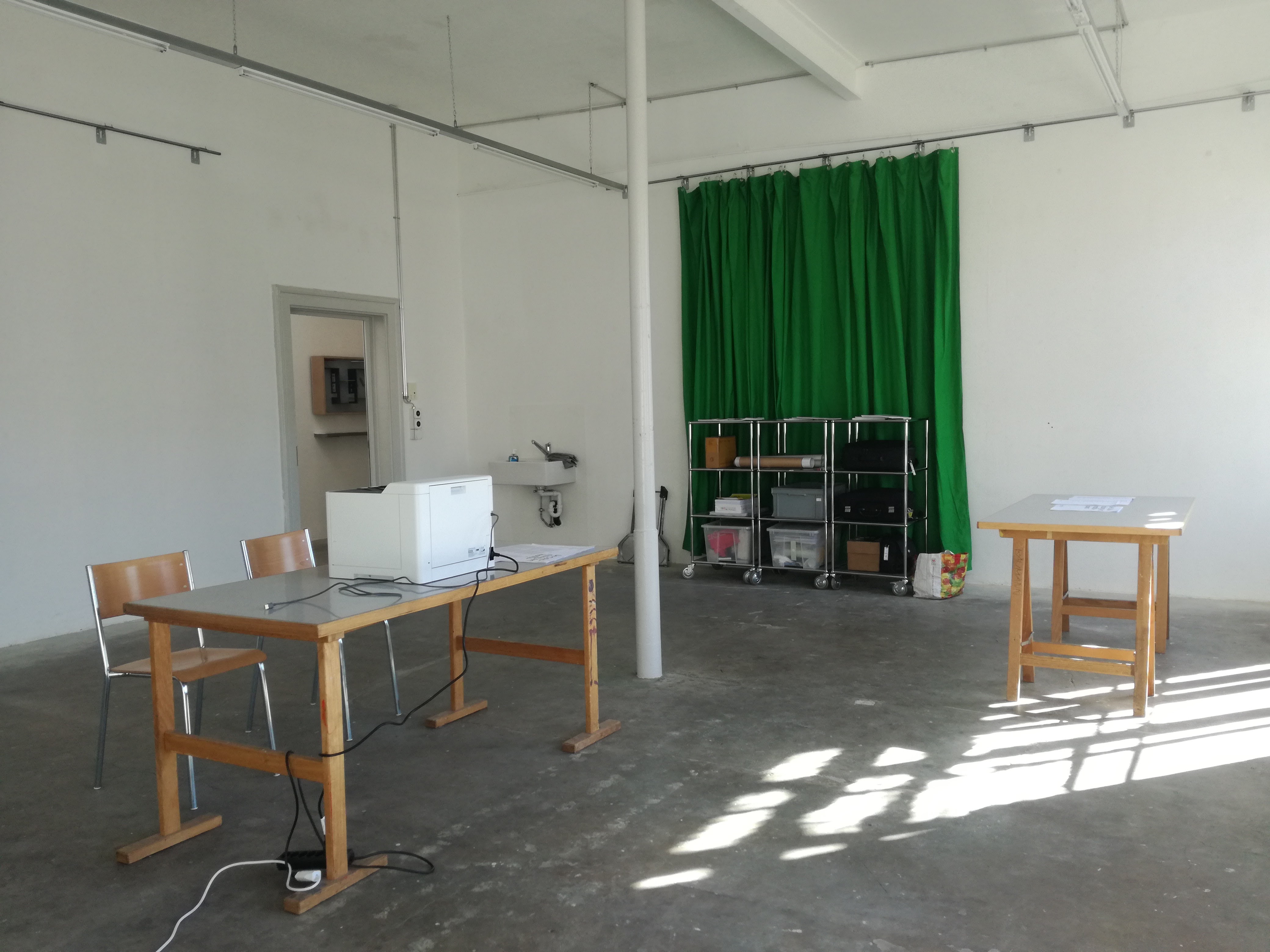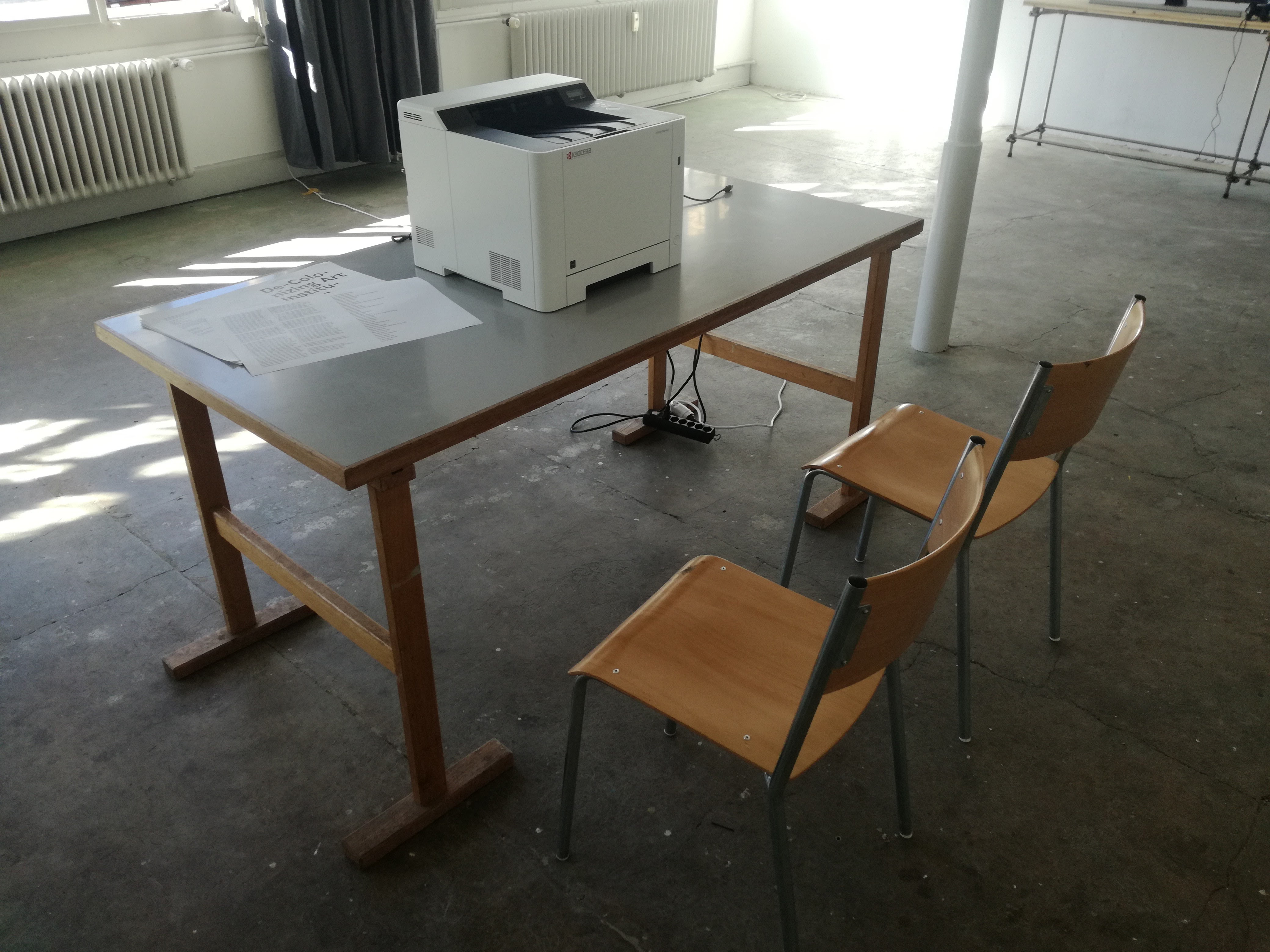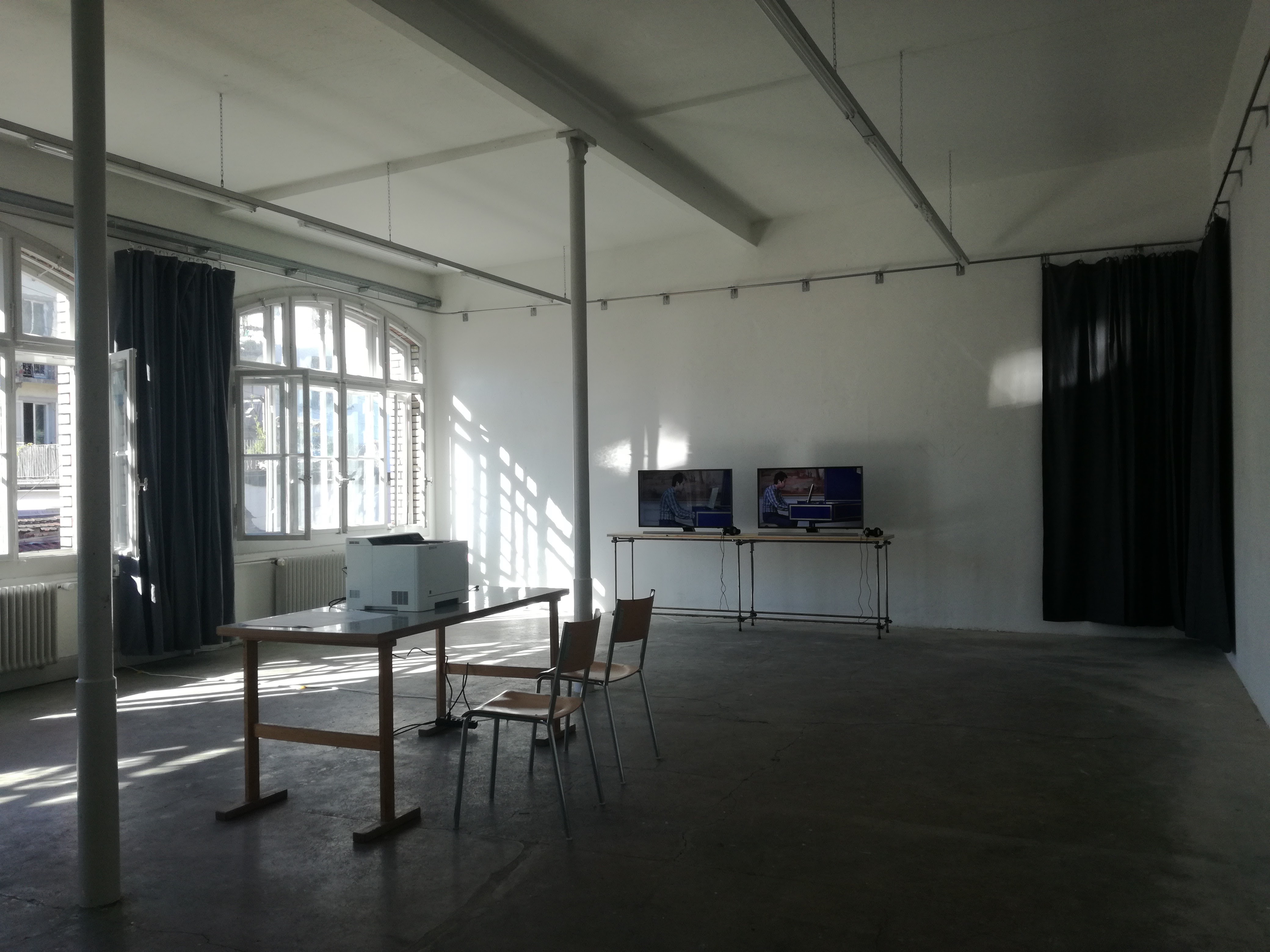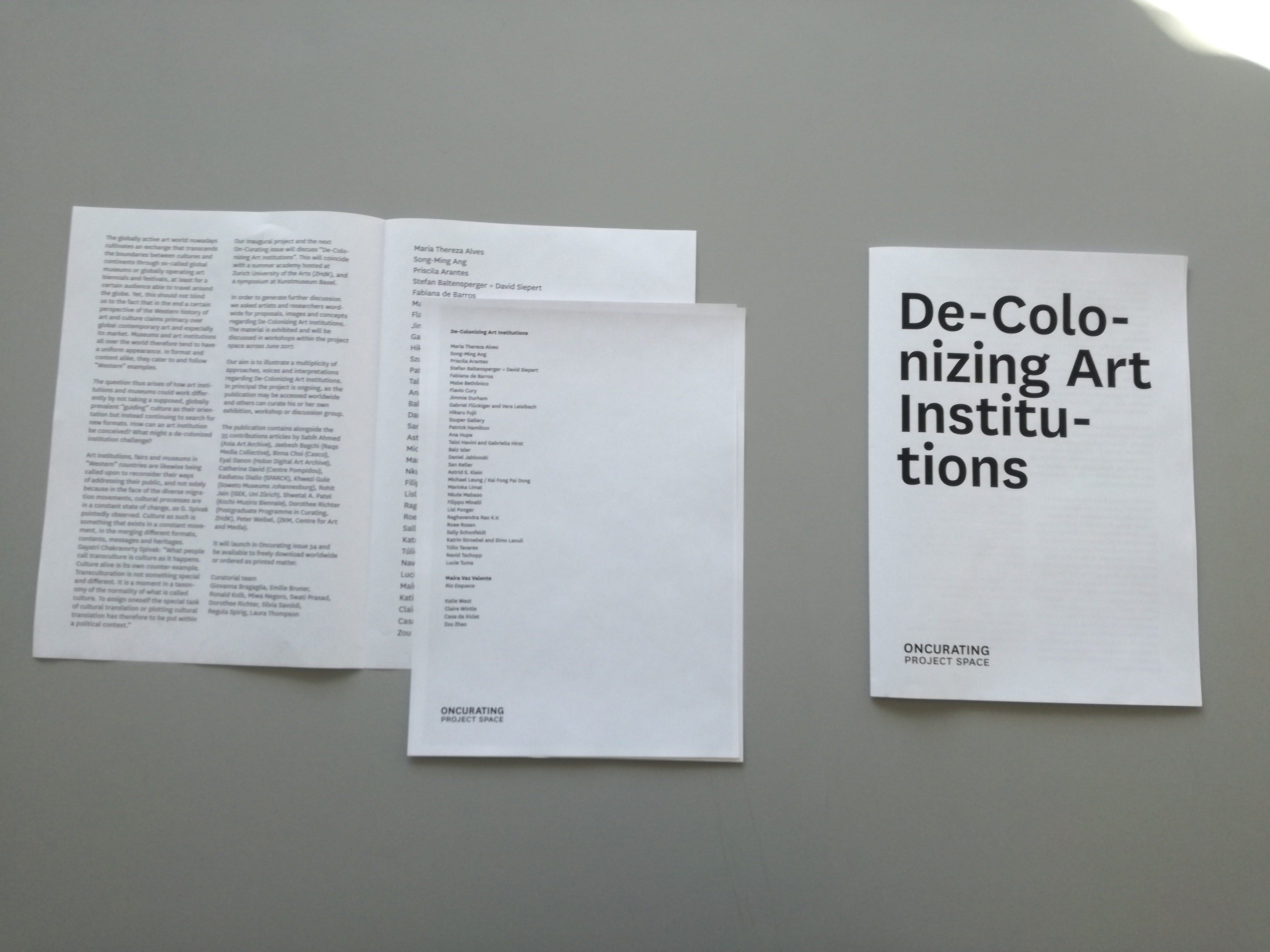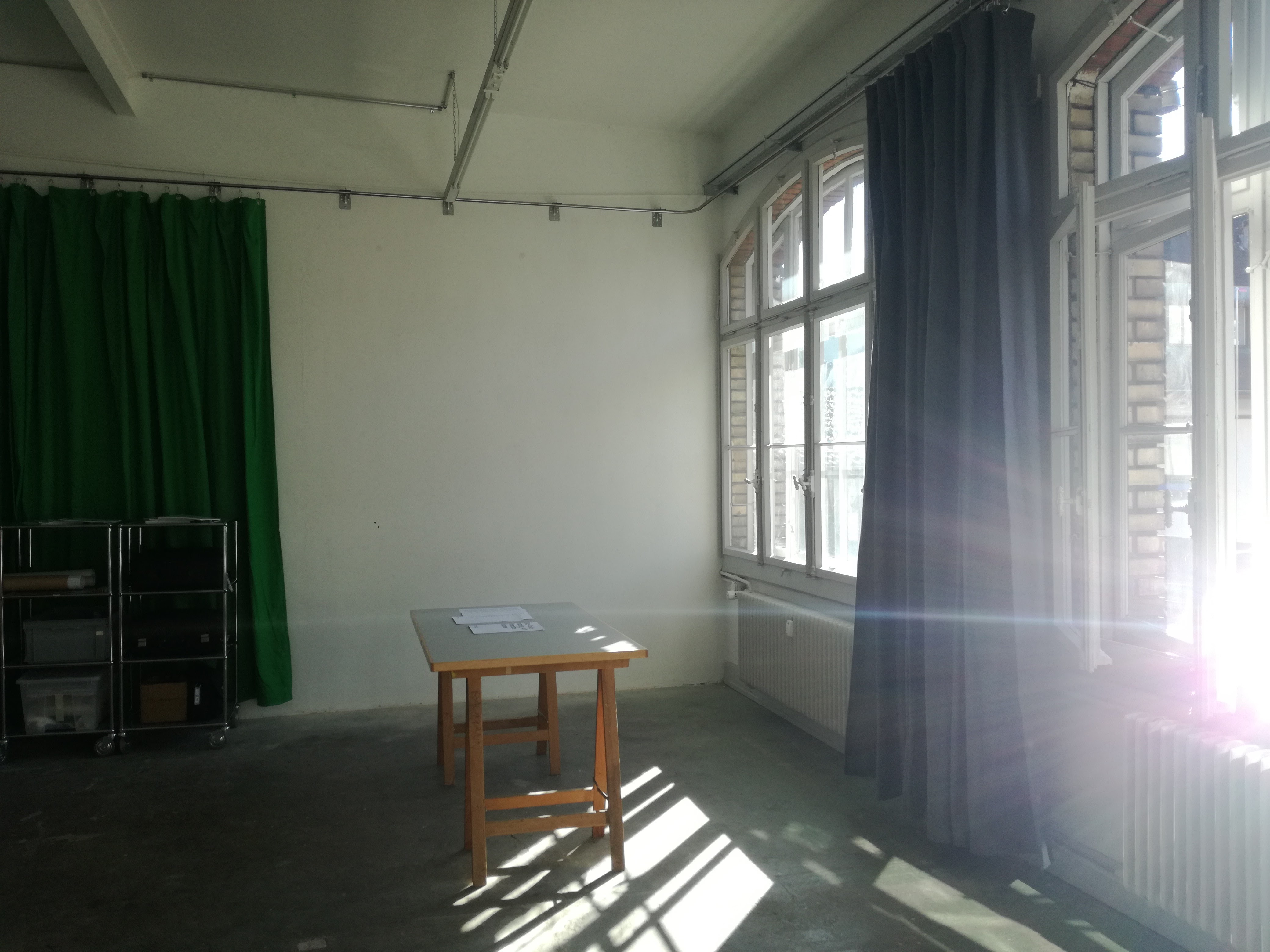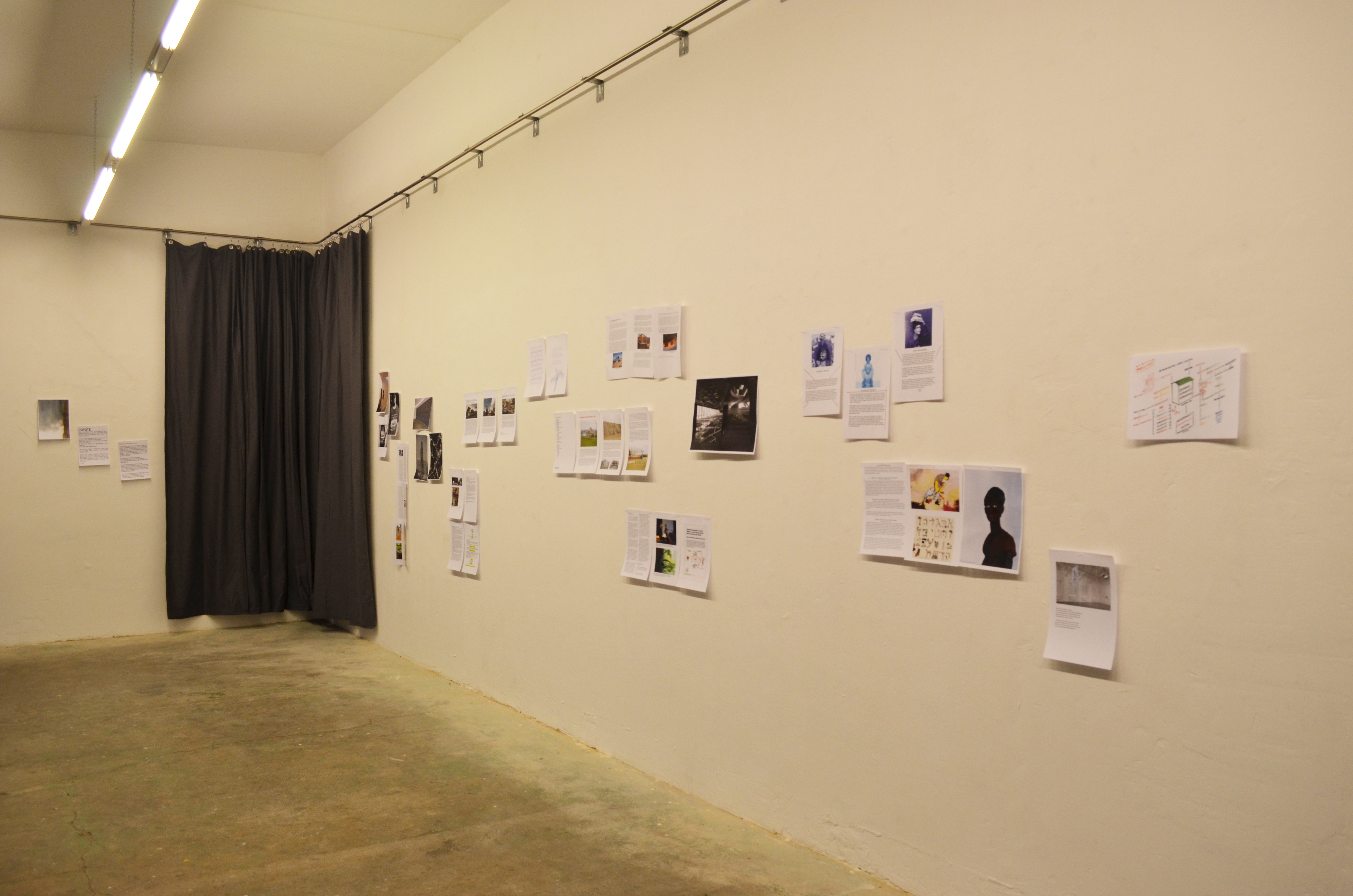Deutsche Version unten
23.5.– 06.06.2017
De-Colonizing Art Institutions
Shared exhibition
Opening: 22 May 2017, 7pm
Artists Contributions by Maria Thereza Alves, Song-Ming Ang, Priscila Arantes, Stefan Baltensperger + David Siepert, Fabiana de Barros, Mabe Bethônico, Flavio Cury, Jimmie Durham, Gabriel Flückiger and Vera Leisibach, Hikaru Fujii, Szuper Gallery, Patrick Hamilton, Taloi Havini and Gabriella Hirst, Ana Hupe, Balz Isler, Daniel Jablonski, Kai Fong Pai Dong, San Keller, Astrid S. Klein, Marinka Limat, Nkule Mabaso, Filippo Minelli, Lisl Ponger, Raghavendra Rao K.V., Roee Rosen, Sally Schonfeldt, Katrin Ströbel and Mohammed Laouli, Túlio Tavares, Navid Tschopp, Maíra Vaz Valente, Claire Wintle, Casa da Xiclet, Zou Zhao
Curatorial Team: Giovanna Bragaglia, Emilie Bruner, Ronald Kolb, Miwa Negoro, Swati Prasad, Dorothee Richter, Silvia Savoldi, Regula Spirig, Laura Thompson
The globally active art world nowadays cultivates an exchange that transcends the boundaries between cultures and continents through so-called global museums or globally operating art biennials and festivals, at least for a certain audience able to travel around the globe. Yet, this should not blind us to the fact that in the end a certain perspective of the Western history of art and culture claims primacy over global contemporary art and especially its market. Museums and art institutions all over the world therefore tend to have a uniform appearance. In format and content alike, they cater to and follow “Western” examples.
The question thus arises of how art institutions and museums could work differently by not taking a supposed, globally prevalent “guiding” culture as their orientation but instead continuing to search for new formats. How can an art institution be conceived? What might a de-colonized institution challenge?
Art institutions, fairs and museums in “Western” countries are likewise being called upon to reconsider their ways of addressing their public, and not solely because in the face of the diverse migration movements, cultural processes are in a constant state of change, as G. Spivak pointedly observed. Culture as such is something that exists in a constant movement, in the merging different formats, contents, messages and heritages.
Gayatri Chakravorty Spivak: “What people call transculture is culture as it happens. Culture alive is its own counter-example. Transculturation is not something special and different. It is a moment in a taxonomy of the normality of what is called culture. To assign oneself the special task of cultural translation or plotting cultural translation has therefore to be put within a political context.”
Our inaugural project and the next On-Curating issue will discuss “De-Colonizing Art Institutions”. This will coincide with a summer academy hosted at Zurich University of the Arts (ZHdK), and a symposium at Kunstmuseum Basel.
In order to generate further discussion we asked artists and researchers wordwide for proposals, images and concepts regarding De-Colonizing Art Institutions. The material is exhibited and will be discussed in workshops within the project space across June 2017.
Our aim is to illustrate a multiplicity of approaches, voices and interpretations regarding De-Colonizing Art Institutions. In principal the project is ongoing, as the publication may be accessed worldwide and others can curate his or her own exhibition, workshop or discussion group.
The publication contains alongside the 34 contributions articles by Sabih Ahmed (Asia Art Archive), Jeebesh Bagchi (Raqs Media Collective), Binna Choi (Casco), Eyal Danon (Holon Digital Art Archive), Catherine David (Centre Pompidou), Kadiatou Diallo (SPARCK), Khwezi Gule (Soweto Museums Johannesburg), Rohit Jain (ISEK, Uni Zürich), Shwetal A. Patel (Kochi-Muziris Biennale), Dorothee Richter (Postgraduate Programme in Curating, ZHdK), Peter Weibel, (ZKM, Centre for Art and Media).
Die global agierende Kunstwelt pflegt heute einen Austausch, der die Grenzen zwischen Kulturen und Kontinenten durch so enannte globale Museen oder global agierende Kunstbiennalen und Festivals überschreitet. Dies kann natürlich nur von einem deziediertem Publikum gesehen werden, das sich erlauben kann zu reisen . Dies sollte jedoch nicht darüber hinwegtäuschen, dass schussendlich eine westliche Perspektive der Kunst- und Kulturgeschichte die Hegemonie an globaler zeitgenössischer Kunst und insbesonderem ihrem Markt beansprucht. Museen und Kunstinstitutionen auf der ganzen Welt haben daher ein einheitliches Erscheinungsbild. In Format und Inhalt orientieren sie sich an „westlichen“ Beispielen.
So stellt sich die Frage, wie Kunstinstitutionen und Museen anders arbeiten könnten, indem sie sich nicht an einer vermeintlich global vorherrschenden „Leitkultur“ orientieren, sondern nach neuen Formaten suchen. Wie kann eine Kunstinstitution anders konzipiert werden? Was könnte eine entkolonisierte Institution herausfordern?
Auch Kunstinstitutionen, Messen und Museen in „westlichen“ Ländern sind aufgerufen, ihre Angebote für ihr Publikum zu überdenken, nicht nur, weil sich kulturelle Prozesse angesichts der vielfältigen Migrationsbewegungen in einem ständigen Wandel befinden, wie G. Spivak pointiert feststellte. Kultur als solche ist etwas, das in ständiger Bewegung ist, in der Verschmelzung verschiedener Formate, Inhalte, Botschaften und Erbschaften.
In Gayatri Chakravorty Spivak Worten: „Was man Transkultur nennt, ist Kultur, wie sie geschieht. Eine lebendige Kultur ist das beste Gegenbeispiel von Kultur. Transkulturalität ist nicht etwas Besonderes und Andersartiges. Es ist ein Moment in einer Taxonomie der Normalität dessen, was man Kultur nennt. Die besondere Aufgabe der kulturellen Übersetzung muss daher in einen politischen Kontext gestellt werden.“
Unsere erste Ausstellung im Oncurating Projekts Space handelt von „De-Colonizing Art Institutions“. Parallel dazu findet eine Sommerakademie an der Zürcher Hochschule der Künste (ZHdK) und ein Symposium im Kunstmuseum Basel statt.
Um weitere Diskussionen anzuregen, haben wir Künstler und Forscher weltweit nach Vorschlägen, Bildern und Konzepten zu De-Colonizing Art Institutions gefragt. Das Material ist ausgestellt und wird in Workshops im Projektraum im Juni 2017 diskutiert.
Unser Ziel ist es, eine Vielzahl von Ansätzen, Stimmen und Interpretationen zu entkolonisierenden Kunstinstitutionen zu veranschaulichen. Das Projekt kann online angesehen werden, da die Publikation und die Beiträge weltweit zugänglich ist und auch heruntergeladen werden kann. So können andere eine eigene Ausstellung, einen Workshop oder eine Diskussionsgruppe kuratieren mit diesem Material.
Die Publikation enthält neben den 34 Beiträgen von Sabih Ahmed (Asia Art Archive), Jeebesh Bagchi (Raqs Media Collective), Binna Choi (Casco), Eyal Danon (Holon Digital Art Archive), Catherine David (Centre Pompidou), Kadiatou Diallo (SPARCK), Khwezi Gule (Soweto Museen Johannesburg), Rohit Jain (ISEK, Uni Zürich), Shwetal A. Patel (Kochi-Muziris Biennale), Dorothee Richter (ZHdK), Peter Weibel (ZKM, Zentrum für Kunst und Medien).
The outcome of this exhibition is published in the Oncurating Issue 34.
Die Beiträge der Ausstellung sind im Oncurating Issue 34 veröffentlicht
Maria Thereza Alves
Song-Ming Ang
Priscila Arantes
Stefan Baltensperger + David Siepert
Fabiana de Barros
Mabe Bethônico
Flavio Cury
Jimmie Durham
Gabriel Flückiger and Vera Leisibach
Hikaru Fujii
Szuper Gallery
Patrick Hamilton
Taloi Havini and Gabriella Hirst
Ana Hupe
Balz Isler
Daniel Jablonski
San Keller
Astrid S. Klein
Michael Leung / Kai Fong Pai Dong
Marinka Limat
Nkule Mabaso
Filippo Minelli
Lisl Ponger
Raghavendra Rao K.V.
Roee Rosen
Sally Schonfeldt
Katrin Stroebel and Simo Laouli
Túlio Tavares
Navid Tschopp
Lucie Tuma
Maíra Vaz Valente
Claire Wintle
Casa da Xiclet
Casa da Xiclet (portuguese)
Zou Zhao
Kooperation mit / cooperation with
PhD in Practice in Curating, University of Reading
